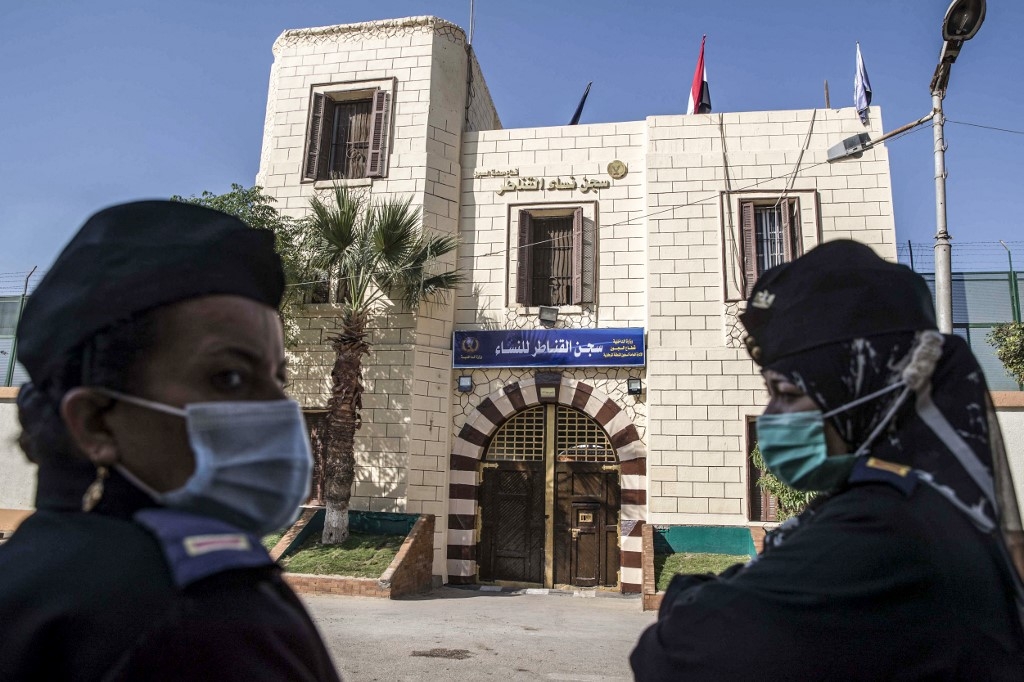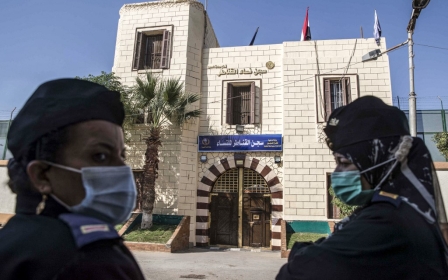Egypt: Prisons employ 'systemic sexual violence' against detainees

“Systemic sexual violence” is being employed by Egyptian security personnel and prison staff against detainees as a method to coerce confessions and instil fear, a new report finds.
The report, by the Freedom Initiative and the Egyptian Front for Human Rights, was published on Thursday and documents over 650 instances of sexual violence against detainees and their loved ones between 2015 and 2022, “in a widespread violation of human rights”.
“From the moment of arrest, no one is safe from sexual violence in Egyptian detention. Detainees from all walks of life, as well as their families and loved ones, are subjected to horrific sexual violence at the hands of the state,” said Amr Ahmed, research manager at the Freedom Initiative.
“It is deplorable that security personnel and prison staff are willing to use sexual violence to degrade and torture.”
New MEE newsletter: Jerusalem Dispatch
Sign up to get the latest insights and analysis on Israel-Palestine, alongside Turkey Unpacked and other MEE newsletters
Abuse 'rife' in police stations
Police stations are “rife” with sexual violence, which targets detainees of all genders, who face a variety of allegations or pretexts for arrests, whether political or criminal, the report says.
Out of the incidents documented, 80 percent had been committed in National Security Agency (NSA) sites in Al-Abbasiya and Lazoughly in Cairo, and Abbis in Alexandria.
“Sexual violence in police stations took a variety of forms, purposes, and targets. In some instances, guards exploited detainees for their own sexual gratification and projection of personal power; in other instances, sexual violence was used as a punitive measure, often through electrocution of the genitals (for men and women).”
The abuses were often carried out in conjunction with periods of enforced disappearance in which the detainees had “no access to lawyers or ability to report or document the abuse they endured”.
While disappeared, detainees are removed from even the limited laws and procedures that exist to help victims report abuse. They are denied contact with their lawyers, resulting in either the under-reporting of instances of sexual violence or mention of it in front of prosecutors.
“Sexual violence often took place during interrogations at NSA sites where detainees would be raped, molested, electrocuted in their genitals, or threatened with sexual violence against them or their family members to coerce confessions.
"These confessions were often used as evidence against them in later trials,” the report says.
The detainees’ family members are also subjected to sexual violence during their visits to the prisons, often under the guise of “cavity searches”.
Lasting trauma
For many detainees, the sexual abuse did not end with their release from prison, as probationary measures often required them to return to police stations, exposing them to renewed abuse or representing "a traumatic visit to the site of past abuses”, the report says.
It’s also difficult for detainees to speak out about the abuse or seek accountability, due to “stigmas around detention, sexual abuse, and, in some cases, their gender or sexual identity”.
“Victims face immense challenges to speaking out and in the absence of independent investigations, the cases we documented likely represent just a sliver of the full count,” said Kareem Taha, deputy director of the Egyptian Front for Human Rights.
'Sexual violence at the hands of the state is pervasive and just another tool authorities are using to control the bodies and lives of those it views as its subjects'
- Kareem Taha, Egyptian Front for Human Rights
In order to pursue a complaint, victims would need to identify their perpetrator, present evidence of their assault, and even to provide a location and date of abuse. This is a stumbling block, as victims are often blindfolded when they are abused.
The perpetrators are almost never held accountable, even when violations have been documented by government officials.
At least three prisoners who endured sexual violence as a form of torture were later executed. Many remain detained or forcibly disappeared.
“Sexual violence at the hands of the state is pervasive and just another tool authorities are using to control the bodies and lives of those it views as its subjects,” said Taha.
Allison McManus, the Freedom Initiative’s research director, called on the United States to take a stand against such abuses in Egypt.
“As a major security partner to Egypt, American officials have a responsibility to condemn sexual violence happening in Egyptian prisons and a duty to ensure that any intelligence sharing does not depend on information elicited through torture.
“We have to make sure that those who bravely told their stories despite the stigma and unimaginable repression they face did not do so in vain," McManus said.
Middle East Eye delivers independent and unrivalled coverage and analysis of the Middle East, North Africa and beyond. To learn more about republishing this content and the associated fees, please fill out this form. More about MEE can be found here.




